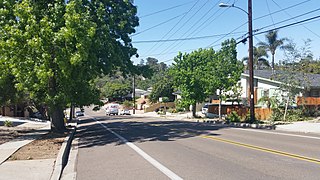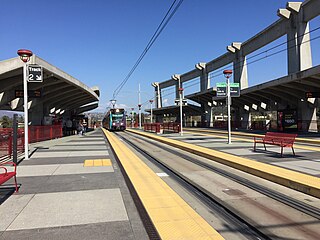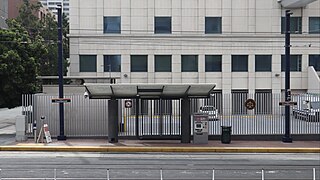
The San Diego Trolley is a light rail system operating in the metropolitan area of San Diego. The Trolley's operator, San Diego Trolley, Inc., is a subsidiary of the San Diego Metropolitan Transit System (MTS). The trolley operates as a critical component of the MTS, with connections to and integrated travel tickets with the local bus systems.

The College Area is a residential community in the Mid-City region of San Diego, California, United States. The College Area is dominated by San Diego State University, after which the area is named. Several neighborhoods in the College Area were developed in the 1930s, with others becoming established in the post-war period. The College Area is bordered on the west by Kensington and Talmadge and on the east by the city of La Mesa. El Cajon Boulevard is a busy shopping district; additional retail, entertainment and dining establishments are located in a new housing and commercial complex known as South Campus Plaza on College Avenue at Aztec Center. The College Area includes the neighborhoods of the Catoctin Area, Dennstedt Point, East Falls View Drive, Saranac-Mohawk, and an Orthodox Jewish neighborhood in the area near Congregation Beth Jacob Orthodox Synagogue on College Avenue. The region includes UC San Diego Health East Campus Medical Center, a 306-bed acute care facility, and the College-Rolando branch of the San Diego Public Library.

Old Town Transit Center, also known as San Diego–Old Town station, or Old Town San Diego station, is an intermodal transportation station located in the Old Town neighborhood of San Diego, California. It is served by Amtrak's Pacific Surfliner, the COASTER commuter rail service, and the San Diego Trolley, as well as numerous San Diego Metropolitan Transit System bus lines.

The San Diego Metropolitan Transit System is a public transit service provider for central, southern, northeast, and southeast San Diego County, California, as well as for the city of San Diego. The agency directly operates a large transit system that includes the MTS Bus, San Diego Trolley light rail, and Rapid bus rapid transit services. The MTS also controls the San Diego and Arizona Eastern (SD&AE) freight railway and regulates taxicabs, jitneys, and other private for-hire passenger transportation services.

Fashion Valley Transit Center is an elevated station on the Green Line of the San Diego Trolley system. It is located at the southwest corner of the Fashion Valley Mall, after which the station is named. Below the station platform is a large bus plaza served by several MTS bus routes. The station has a 63 space park and ride lot.

Stadium station is a San Diego Trolley stop on the Green Line. The elevated station has an island platform as well as side platforms. It was built in the parking lot of the former San Diego Stadium. The area around the station is undergoing re-development into San Diego State University's Mission Valley campus and Snapdragon Stadium for the San Diego State Aztecs football team.

70th Street station is a San Diego Trolley station served by the Green Line in La Mesa, California, in the United States. The next station west is Alvarado, and the next station east is Grossmont Transit Center.

El Cajon Transit Center is a San Diego Trolley station served by the Orange and the Green lines in the San Diego suburb of El Cajon, California. The station is a major commuter center for the large suburb and is the convergence of multiple local and regional bus routes operated by the Metropolitan Transit System and Greyhound Lines.

The Blue Line is a 26.3-mile (42.3 km) light rail line in the San Diego Trolley system, operated by San Diego Trolley, Inc., an operating division of the San Diego Metropolitan Transit System (MTS). With an end-to-end travel time of one hour and twenty-three minutes, it operates between the UTC Transit Center and the San Ysidro Transit Center, the latter of which is at the border with Mexico directly adjacent to the San Ysidro Port of Entry, facilitating easy connections across the border. The line serves La Jolla, Downtown San Diego, National City, Chula Vista, and San Ysidro.

The Orange Line is an 18.0-mile (29.0 km) light rail line in the San Diego Trolley system, operated by San Diego Trolley, Inc. an operating division of the San Diego Metropolitan Transit System. The route connects Downtown San Diego with the cities of Lemon Grove, La Mesa, and El Cajon. The Orange Line has the lowest ridership of the San Diego Trolley's three regular lines, transporting 10,896,289 riders during FY 2014 according to the MTS.

The Green Line is a 23.6-mile (38.0 km) light rail line in the San Diego Trolley system, operated by San Diego Trolley, Inc. an operating division of the San Diego Metropolitan Transit System (MTS). The route serves Downtown San Diego, Mission Valley, and the cities of La Mesa, El Cajon, and Santee. The Green Line has the second highest ridership of the San Diego Trolley's three regular lines, transporting 13,673,926 riders during FY 2014 according to the MTS.

Santee station is a station on the Green Line of the San Diego Trolley, in the San Diego suburb of Santee, California. The station currently serves as the Green Line's northeastern terminus and serves as a major park and ride station. It is located inside a shopping center on the northeast corner of the intersection of Mission Gorge Road and Cuyamaca Street.

San Ysidro Transit Center is a San Diego Trolley station in the San Ysidro neighborhood of San Diego, California. The station is the southern terminus of the Blue Line and is located on a short rail spur off the San Diego and Arizona Eastern Railway main line which hosts the Blue Line to Downtown San Diego.

12th & Imperial Transit Center is a San Diego Trolley station in Downtown San Diego, California. It is located in the East Village neighborhood of the city and serves the high-density residential developments that surround the stop. It is one of two stations from which Petco Park can be reached. The station has historically been used as a major transfer point between the various Trolley lines and is the only station that is directly served by all four Trolley lines.

H Street station is a station on the Blue Line of the San Diego Trolley located in the city of Chula Vista, California. The stop serves both as a commuter center with a park and ride lot and as an access point to the nearby dense retail and large residential areas. It also provides access to nearby Southwestern Community College by way of the 709 bus.

Iris Avenue Transit Center is a station on the Blue Line of the San Diego Trolley in the Otay Mesa West neighborhood of San Diego. The stop serves a variety of purposes, holding the function of commuter center with a park and ride lot and to provide access to the nearby commercial and residential areas.

Rapid is the brand name given to the bus rapid transit system in San Diego County, California. The system serves nearly half the county, operating mainly on the HOV lanes on Interstates 15 and 805, with most of the stops also served by other routes. In addition, there are stations, dubbed as CenterLine in the medians of Interstate 15, Park Boulevard in San Diego and on East Palomar Street in Chula Vista, that are designed in a similar manner to the light rail stations. The system operates with a dedicated fleet, although buses from the Mainline fleet are regularly substituted. The system is administered, built and managed by San Diego Association of Governments (SANDAG) and is operated as part of the San Diego Metropolitan Transit System (MTS).

Courthouse station is a light rail station in San Diego, California, United States. It is the western terminus of the San Diego Trolley's Orange Line and is located between the Hall of Justice and San Diego Central Courthouse in Downtown San Diego, on C Street between State and Union streets. The station opened on April 29, 2018, after nearly a year of construction.

The Copper Line, officially the Copper Line - East County Connector, is a proposed line of the San Diego Trolley in East County, San Diego. If approved, it would operate as a shuttle between the El Cajon Transit Center and the Santee Town Center station, replacing the existing Green and Orange line service in that area. The San Diego Metropolitan Transit System (SDMTS) proposed the Copper Line because the section of the line between Gillespie Field station and Santee Town Center has a single track, which has been the source of delays that impact both the Green and Orange lines. The Copper Line would alleviate these issues by creating a dedicated shuttle service disconnected from the larger Green and Orange lines.





















